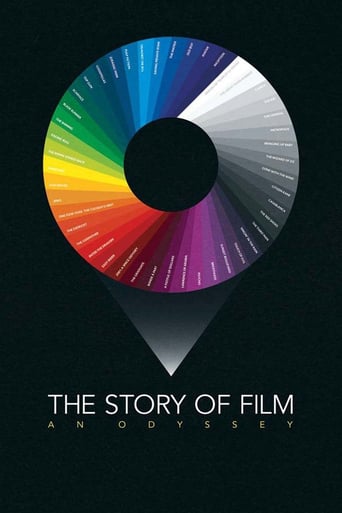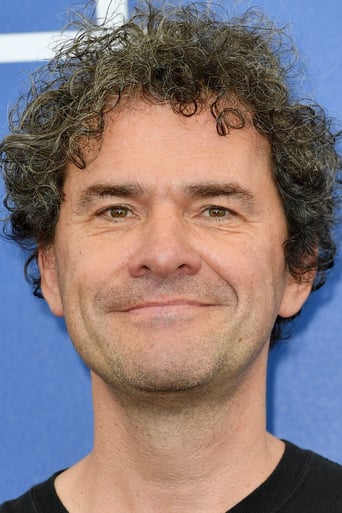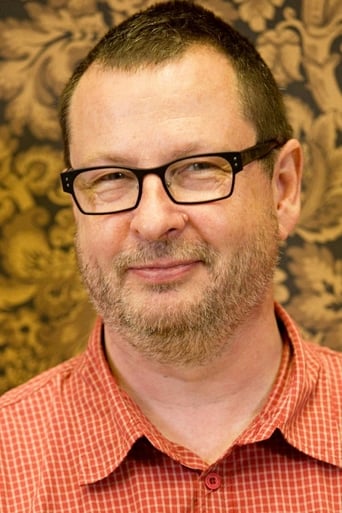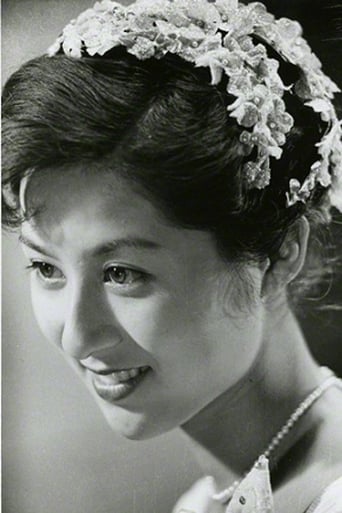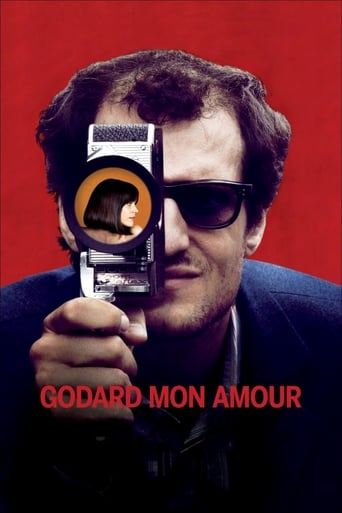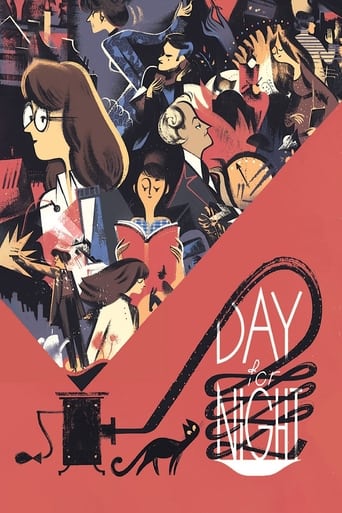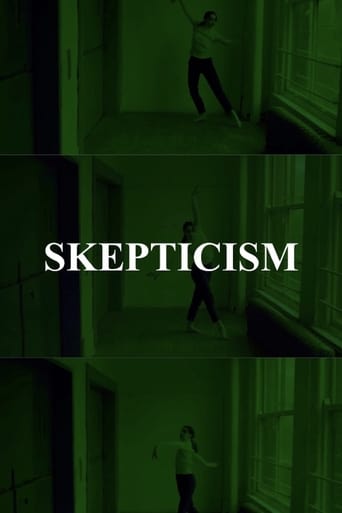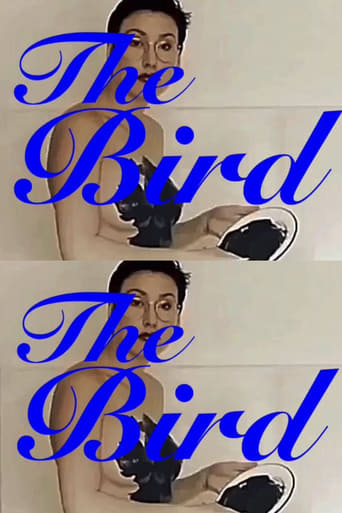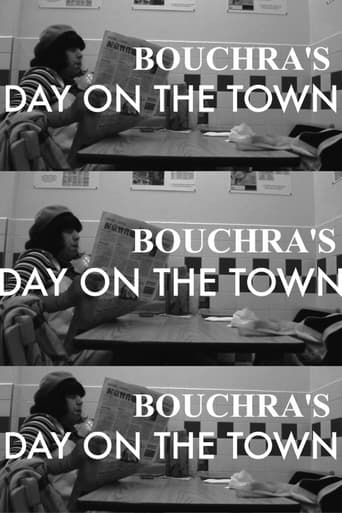The Story of Film: An Odyssey (2011)
The story of international cinema told through the history of cinematic innovation. Covering six continents and 12 decades, showing how film-makers are influenced both by the historical events of their times, and by each other.
Watch Trailer
Cast


Similar titles
Reviews
Fantastic!
Excellent, a Must See
It’s not bad or unwatchable but despite the amplitude of the spectacle, the end result is underwhelming.
Easily the biggest piece of Right wing non sense propaganda I ever saw.
Probably the most extensive documentary made on the history of film, and deserves respect for that alone.I particularly liked the objective stuff, the historical development of film, the pivotal moments and movies. Hated Mark Cousins' narration: first time I attempted to watch the series I gave up after 10 minutes- his intonations were that irritating. Second time round I gritted my teeth and eventually got accustomed to his narration (still didn't like it though). Also hated the pretentiousness of the subjective stuff. Yes, its art, so critiquing movies is by definition subjective, but Cousins glorifies movies and directors which/who are clearly not worth of that degree of praise. Some of it is pure "Look at how clever I am - I just mentioned a director/movie you've never heard of". Cousins is very up himself.Overall it was an edifying experience, but could have been a lot better.
I guess enough has been said about Cousins' dreadful narration (if you'd like listening to a sine wave in an endless loop, however, then this will be right up your alley), but the major flaw of this documentary is that it commits the cardinal sin of filmmaking: it's boring. God, it's boring. It might be dull enough to make some film buffs want to abandon their hobby forever. Shouldn't a documentary about film be...fun? Brian Doan stated in his critique of the 15-part, 17-hour film, "Why, when faced with the prospect of watching yet another episode in order to finish this piece, did I sigh and trudge up to my office, as if headed into certain doom?" I couldn't have said it any better. Still, I also watched the entire series, figuring (after 5 or 6 episodes in), I've already lost several hours of my life I'll never get back, why not just finish myself off?! Seriously, though, I was hopeful that something interesting or exciting would happen in this seemingly interminable epic. The production quality is also a bit pedestrian, with many insipid and irrelevant insert shots that pad the documentary between actual movie clips. One could forgive Cousins' that, I guess, due to a low budget. But, since when in filmmaking has a low budget stifled creativity? Then there's Cousins' own apparent biases (OK we get it! You LOVE African movies and HATE Hollywood musicals, comedies and dramas!) and I won't even begin to get into his political bias.Too many influential films are never given a mention (though, I understand this documentary was cut down to a fraction of it's original length!), while other important films (like Fritz Lang's "Metropolis") are mentioned- but barely. Cousins' also makes some peculiar comments in the film. For instance, he (several times) refers to specific characters as "Catholic" (presumably using the non-secular definition of the word) or "Protestant." First of all, how does he know this? Secondly, even though he's from Northern Ireland, did he not foresee that people in less denominationally-obsessed parts of the world, would find that strange? He also makes several flubs that clearly reveal his lack of familiarity with American culture and its relationship to and reflection in American filmmaking. There are some bright spots, of course. Cousins' penchant for African, Iranian, Asian and Eastern European films will certainly revive interest in them and introduce them to audiences who probably would have never heard of them otherwise. The array of interviews with actors and insiders was impressive (seeing Claudia Cardinale was a particular treat!) But, unfortunately, the cons outweigh the pros in this lengthy "love letter to the movies." With the TCM airing bringing this to so many people, this was such a missed opportunity, that it's a shame. So is the 17 hours of my life I'll never get back.
Let me start out by saying that I liked the episodes I viewed and enjoyed learning more about foreign cinema but the narration is so bad that I had to stop and delete from my netflix list. The critical reviews I've read say the Narrator's voice (Mark cousins) is "Lilting" like that somehow romanticizes it and brushes aside how obnoxious it is to UPEND every sentence and phrase. I agree with most of the reviews enjoying the detailed and heartfelt appreciation given to the films discussed but I could and will not watch the rest of this documentary series because of the poor narration. I really do hope that the film maker goes back and hires a professional voice actor to redo all the lines that were said.If you can endure this you will learn a lot about films. I had to end the pain.
Kaleidoscopic series documenting film from the late 1800's.Irish critic Michael Cousins has an idiosyncratic means of presentation but I found him a congenial, sensitive, and intelligent guide in a journey that truly does feel like an odyssey in its wonder, variety, and complexity.Films I'd like to see or re-view based on Cousins' introduction/interpretation: 1) Stagecoach. Ford: "It's the little guy that does the courageous things." 2) Citizen Kane. Welles' attraction to powerful people is like Shakespeare's. Kane's world is massive but empty. 3) Best Years of Our Lives. Frederick March. "Just as in real life we cannot see everything we would like to." 4) Code Unknown. Binoche. Wife getting away from husband on subway.5) How to Marry a Millionaire.6) Un Homme et une Femme.7) Rome -- Open City (1945). City's struggle to resist fascism. Magnani pregnant, unmarried, unglamorous, older. Italian neo-realism: bald light bulbs.8) Bicycle Thieves. Kid almost hit by car twice. No time for, interest in, hugs.9) Double Indemnity. Noir. Hollywood. "Hardly anyone walks so those that do can hear their own footsteps." "America's most curious filmmakers went abroad." Billy Wilder fled Nazis for sun-drenched Ca. "Loved the unpretentiousness of America, hated its worship of money." 10) Chinatown. Robert Type, writer. "Flaw draws them to fate as they try to avoid it." 11) Out of the Past. Robert Mitchum "wants a decent girl but can't stay out of the way.' "Crackled with snappy dialog." 12) Rio Bravo. Angie Dickinson "got all the best lines." 13) Out of the Past. Jean Greer knows the man is weak.14) The Hitchhiker. Ida Lupino "mastered the noir form." 15) Quai des Brumes.16) La Chienne. Man in love with hard-hearted woman.17) Two for the Road. Donen: "Such a hard, tough look at marriage." 18) Singin' in the Rain. "He's not worried about getting wet. He's so joyful that rain doesn't bother him. He's thrilled with being in love." 19) A Matter of Life and Death. Doomed Niven: "I'll be a ghost and come visit you." 20) Listen to Britain. Mozart piano concerto. "Things that get people through trauma together...It might be the last summer when they're free." 21) The Third Man. "One of the most daring of endings."22) Gun Crazy. B-movie director Lewis. Bank robbery in LA suburb of Montrose. Presaged Bonnie and Clyde.CHAPTER 6: "Non-Western world decolonized, got confidence...Western world: Sex and power on the mind. 23) Rebel Without a Cause. Emotion bursting at the seams.24) Cairo Station. Egypt: "Even more to kick out against...First great Arab, first great African film. Chahine (born boundary-pusher) alone with his sweaty erotic imagination. Crippled newspaper seller listens as she has sex with another man. Where did he get the balls to be so innovative? Spat on face opening night.25) Satyajit Ray...Junibelle Devi "living in a brothel when Ray found her, needed a dose of morphine each day to keep her going."26) Devi. "She becomes a victim of this regressive mindset." 27) Ikiru. Bureaucrat gets cancer. Most movies of Kurasawa about the energy of the individual...distinguishing themselves from others. Kurasawa hero notable for staying power...Kurasawa's stylebook for cinema. A one-man style school.28) Throne of Blood. Connect with The Godfather climax." 29) Dona Barbara. Mexico. Companion shot, raped by sailors.30) The Pearl. "Becomes a cancer in their lives."31) All that Heaven Allows. Jane Wyman, gardener Rock Hudson. "Viciousness of American conformity."32) Marty. "Access the serious emotions."33) On the Waterfront. Brando. "Your guts is all in your wallet and your trigger finger." "As Freud had taught, the surface is a lie, a mask." 34) And God Created Woman. "Brigette Bardot refused to dress like a posh Parisian woman."CHAPTER 10:More to film in 70s than Coppola and Scorsese! "We tend to think of films as Hollywood but there's so much else going on in the world." 35) Ali, Fear Eats the Soul, Fassbinder. Inspired by "All that Heaven Allows." Fassbinder plays one of the lead character's prejudiced relatives. 36) Bitter Tears of Petra von Kant. Bette Davis in "All About Eve." "Fassbinder takes the American movie much further...has his actors move slowly, inexpressively, as if haunted or exhausted...Wigs and makeup conjure artifice." With amazingly visaged Irm Hermann, Fassbinder's erstwhile secretary and lover: "He treated her appallingly." 37) Fox and his Friends. Full frontal nudity of the director himself, lazily getting out of bed.38) Alice in the Cities. Iconic Boardwalk, Empire State. 39) Gods of the Plague. Non-tense bank robbery. Hertzog: "Wild man of German cinema...its explorer"40) Burden of Dreams. Hertzog speaking Spanish. "Only difference between you and me...I can articulate them...What poetry is all about."41) "Arabian Nights," Pasolini. Shocking image of sexually submission boy. Ken Russell. Air Force to ballet dancer, "rare career move...Movie gangsters are often about display." 42) Performance. "Last act before he's taken away is to shoot Turner -- maybe because he's shown too much of himself...Most imaginative shooting in series...mandatory viewing for film directors." 41) Walkabout. "A life less ordinary...She meets a more vital human being...What sort of person you are -- one who swims in a chlorinated pool or the open sea."

